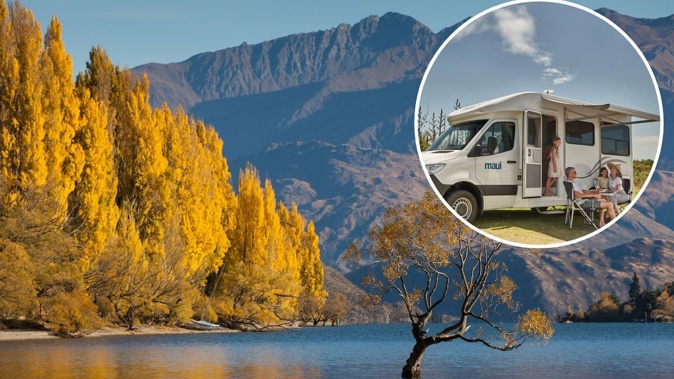
Freedom camping across some of the South Island’s most popular holiday hotspots has surged to the highest levels in the country as a local council moves to adopt a new bylaw aimed at tightening control.
Queenstown Lakes District Council (QLDC) responsible camping programme manager Amy Galloway said recent data showed the district had seen “a rising trend of people wishing to freedom camp” since the borders reopened after Covid-19.
“Data from the CamperMate app indicates that the Queenstown Lakes is the most popular place in New Zealand for freedom camping,” Galloway said.
“Their figures suggested we saw double the number of freedom campers as the next most popular district, which was Nelson–Tasman.”
Between July 2024 and June this year, the number of overnight stays at free campsites across the district, including council and Department of Conservation (DoC) sites, rose 30% on the previous year.
“The Queenstown Lakes does seem to be a very popular place for tourists to visit,” Galloway said.
 Freedom camping is more popular in Queenstown Lakes District than any other region in New Zealand. Photo / George Novak
Freedom camping is more popular in Queenstown Lakes District than any other region in New Zealand. Photo / George Novak
“Since Covid, the numbers have clearly been rising, and unfortunately, our infringement data indicates that same trend.”
Most freedom campers in the district were young Europeans.
“Around 75% of those we surveyed were between 18 and 34, and just over 60% were from Europe. Domestic tourists made up about 15%,” she said.
The council’s previous 2021 bylaw was quashed after a judicial review brought by the New Zealand Motor Caravan Association (NZMCA), which argued it was too restrictive.
That decision left the district without a bylaw for the 2024-25 summer season, and Galloway said the impact was noticeable.
“There was quite a lot of camping on some of our urban roads that we hadn’t seen for many, many summers,” she said.
“That was a challenge.”
The new bylaw, which goes before councillors this week, proposes 15 designated freedom camping sites across the district, up from one under the previous rules.
 Queenstown Lakes District Council is floating a new bylaw to regulate a boom in freedom campers in the region. Photo / NZME
Queenstown Lakes District Council is floating a new bylaw to regulate a boom in freedom campers in the region. Photo / NZME
“Our enforcement team has been enforcing freedom camping bylaws for several years now,” Galloway said.
“The landscape of 15 new restricted sites will be new for us, but the way operations are designed means we can scale up or down depending on demand.”
Galloway said most campers “do want to do the right thing”, but enforcement remains essential.
“The warning of a $400 fine can be a really positive motivator,” she said.
NZMCA national manager of property and policy James Imlach said the association recognised the need for regulation but urged councils not to “overreach”.
“We all want clean, safe camping environments,” Imlach said.
“But too often, bylaws are used to effectively ban responsible freedom camping, when better management and infrastructure could achieve the same outcome without locking people out.”
Imlach said the association’s members supported consistent national standards and clear information for campers.
“Queenstown Lakes has unique pressures, but the solution isn’t to make it harder for people to travel affordably,” he said.
“It’s about balance, maintaining access while protecting communities and the environment.”
Local group Save Clean New Zealand is urging the council to pause the bylaw until further environmental assessments and community consultation are done.
“The potential for contamination, inadequate infrastructure and insufficient enforcement demands a more thorough investigation before implementation,” group secretary Andrea Beryl said.
She warned that Lake Wānaka’s water quality had already declined from excellent to merely good and that improper disposal of human waste from some “self-contained” vehicles risked contaminating lakes, rivers and ecosystems.
“Freedom camping should only happen where there are proper facilities in place,” Beryl said.
“Many so-called ‘self-contained’ vehicles have no functioning on-board toilets, raising the question: where is that waste going? Unfortunately, due to disrespectful individuals who defecate, urinate or wash with soaps, it ends up in our bushes, waterways, and along our shores, further contaminating already vulnerable ecosystems.”
“Has QLDC fully considered the environmental impact of its proposed Freedom Camping Bylaw? While many campers are responsible, there are limited facilities for disposing of sewage. In fact, there are only two of those public facilities between Queenstown and Haast.”
Makaroa locals Colin and Liz Pine called the council’s approach “scattergun”, saying, “We don’t understand why QLDC would opt for a reactive system and not go proactive and identify suitable spots for freedom camping together with waste disposal sites.”
They also raised concerns that many unsuitable rural roads were marked as potential camping locations.
“All rural roads are highlighted on the map, whether they are suitable for freedom camping or not.”
The couple said it was “really concerning” that despite residents’ formal submissions about these sites being unsafe, they remain on the map.
They believe that, if adopted, the bylaw will create ongoing frustration for “campers, residents and law enforcement people”.
The Freedom Camping Bylaw 2025 will go before the full council for adoption this week.
Ben Tomsett is a multimedia journalist based in Dunedin. He joined the Herald in 2023.
Take your Radio, Podcasts and Music with you









